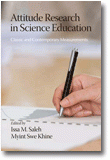
Attitude Research in Science Education
Classic and Contemporary Measurements
Edited by:
Dr. Issa M. Saleh, Bahrain Teachers College in University of Bahrain
Dr. Myint Swe Khine, Bahrain Teachers College in University of Bahrain
Published 2011
The research into how students’ attitudes affect their learning of science related subjects has been one of the core areas of interest by science educators. The development in science education records various attempts in measuring attitudes and determining the correlations between behavior, achievements, career aspirations, gender identity and cultural inclination. Some researchers noted that attitudes can be learned and teachers can encourage students to like science subjects through persuasion. But some view that attitude is situated in context and has much to do with upbringing and environment. The critical role of attitude is well recognized in advancing science education, in particular designing curriculum and choosing powerful pedagogies and nurturing students.
Since Noll’s (1935) seminal work on measuring the scientific attitudes, a steady stream of research papers describing the development and validation of scales have appeared in scholarly publications. Despite these efforts, the progress in this area has been stagnated by limited understanding of the conception of attitude, dimensionality and inability to determine the multitude of variables that made up such concept. This book makes an attempt to take stock and critically examine classical views on science attitudes and explore contemporary attempts in measuring science-related attitudes. The chapters in this book are a reflection of researchers who work tirelessly in promoting science education and highlight the current trends and future scenarios in attitude measurement.
CONTENTS
PART I: INSTRUMENTS AND MEASURING SCIENCE ATTITUDE. Attitude Research in Science Education, ~ Norman Reid. New Approaches to the Study of Students' Response to Science, ~ Lars Brian Krogh. Development and Test of an Instrument That Investigates Teachers' Beliefs, Attitudes and Intentions Concerning the Educational Use of Simulations, ~ Zacharias C. Zacharia, Ioanna Rotsaka, and Tasos Hovardas. Defending Attitude Scales, ~ Per Kind and Patrick Barmby. The Multiple Response Model for the "Views on Science-Technology-Society" (VOSTS) Instrument: An Empirical Application in the Context of the Electronic Waste Issue, ~ Yuqing Yu and Felicia Moore Mensah. Tailoring Information to Change Attitudes: A Meta-Structural Approach, ~ Ya Hui Michelle See and Bernice L. Z. Khoo. Assessment Practices for Understanding Science-Related Attitudes, ~ Carina M. Rebello, Stephen B. Witzig, Marcelle A. Siegel, and Sharyn K. Freyermuth. The Influence of Experiential Learning on Indigenous New Zealanders' Attitude Towards Science: Enculturation into Science by Means of Legitimate Peripheral Participation, Richard K. Coll and Levinia Paku. PART II: SCIENCE ATTITUDE AND SOCIO-SCIENTIFIC ISSUES. Student Attitudes Toward Scientists, ~ Anita Welch and Douglas Huffman. Attitudes towards Science and Scientific Methodology within a Specific Professional Culture, ~ Darko Hren. The factors involved in people’s attitudes toward socioscientific issues, Shu-Nu Chang Rundgren. Attitude Research in Science Education: Looking Back, Looking Forward, ~ Myint Swe Khine and Issa M. Saleh.
-
Paperback978-1-61735-324-6
Web price: $45.04 (Reg. 52.99)
-
Hardcover978-1-61735-325-3
Web price: $80.74 (Reg. 94.99)
- eBook9781617353260

- SCI043000 - SCIENCE: Research & Methodology
- SCI063000 - SCIENCE: Study & Teaching
- EDU000000 - EDUCATION: General
-
 Distance Learning
Volume 20 #4
Distance Learning
Volume 20 #4
-
 Distance Learning
Volume 19 #4
Distance Learning
Volume 19 #4
-
 Distance Learning
Volume 20 #1
Distance Learning
Volume 20 #1
-
 Distance Learning
Volume 20 #3
Distance Learning
Volume 20 #3
-
 Lift Every Voice
Radford University Teacher Education Students
Lift Every Voice
Radford University Teacher Education Students
-
 Middle Grades Research Journal
Volume 13 #2
Middle Grades Research Journal
Volume 13 #2
-
 Rekindling Embers of the Soul
An Examination of Spirituality Issues Relating to Teacher Education
Rekindling Embers of the Soul
An Examination of Spirituality Issues Relating to Teacher Education

